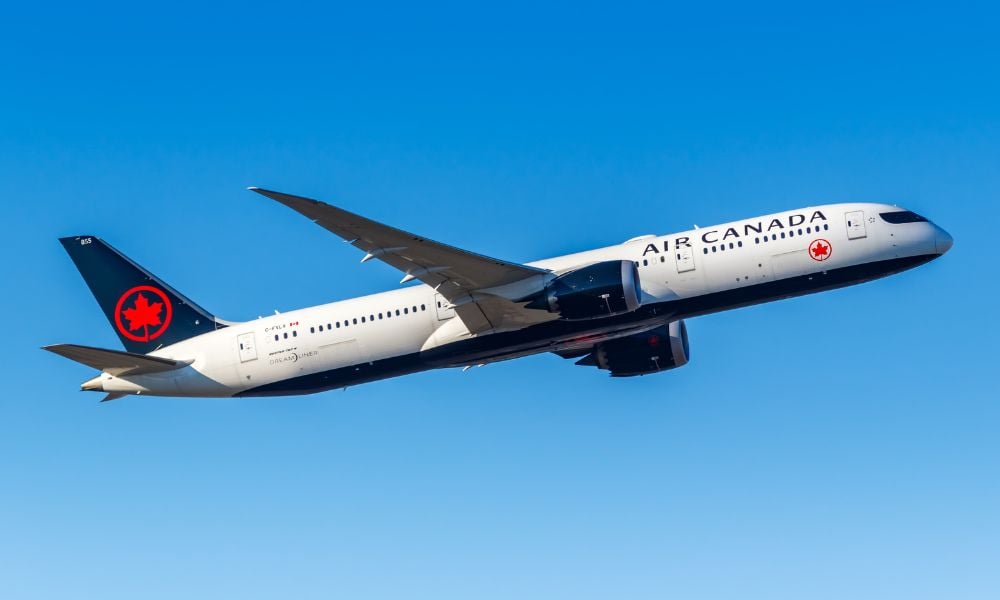Negotiations with pilots' association reach impasse after 15 months

Air Canada is preparing to gradually suspend most of its operations starting as early as Sept. 15, 2024, as talks with the Air Line Pilots Association (ALPA) reach an impasse.
The airline announced it has finalized contingency plans to mitigate customer disruption in the event of a labour strike or lockout, which would affect more than 110,000 daily passengers across its global network.
As the Sept. 15 deadline approaches, Air Canada is preparing for a full shutdown of operations, with flights being progressively canceled over a three-day period.
Ongoing negotiations with association
Negotiations between Air Canada and ALPA, which represents over 5,200 pilots from both Air Canada and its subsidiary Air Canada Rouge, have been ongoing for 15 months. However, the two parties remain far apart on wage demands.
"Air Canada believes there is still time to reach an agreement with our pilot group, provided ALPA moderates its wage demands which far exceed average Canadian wage increases," said Michael Rousseau, president and CEO of Air Canada, in a statement.
The potential shutdown is part of a managed wind-down plan that would begin once either party issues a 72-hour strike or lockout notice, possibly as early as Sept. 15. The airline has committed to ensuring customers are informed and able to adjust their travel plans to avoid being stranded.
"We are publicizing our plans to give the more than 110,000 people who travel with us each day greater certainty and the opportunity to reduce the risk of being stranded by using our goodwill policy to change or defer imminent travel at no cost," Rousseau added.
On social media, ALPA said, “Air Canada Pilots are #ReadyToStrike!”, citing the 2,000 Air Canada pilots who stood together across the country in Vancouver, Winnipeg, Toronto, and Montreal, to mark the end of their federal conciliation period.
“As the two parties have yet to reach a deal, they are in the 21-day cooling-off period, after which they will have the legal right to strike.”
Pilots from numerous ALPA carriers joined the Air Canada pilots on the informational picket lines, said the association, “to show their support for their fellow ALPA pilots’ fight for a contract with fair compensation, respectable retirement benefits, and quality of life improvements.”
Conciliator, mediator appointed by Ottawa
Air Canada has stated that it remains committed to reaching a negotiated settlement, emphasizing that its pilots are among the highest-paid commercial pilots in Canada.
"The company is committed to maintaining its pilots' historic position as the best-paid commercial pilots in Canada," said the airline.
However, with ALPA's wage demands far exceeding what Air Canada considers reasonable, the company has also offered to submit the matter to arbitration.
So far, the Federal Labour Minister has appointed a conciliator and mediator to assist with negotiations. If a settlement is not reached within the 72-hour notice period, Air Canada could seek further government intervention to prevent a prolonged disruption.
"We are also alerting the government of Canada to the potential disruption's impact upon Canadians," Rousseau said.
Air Canada could have to pay more than $100 million to over 2,000 workers who lost their jobs at maintenance centres more than a decade ago, according to lawyers in a class action case.
Customer impact and refund options
Air Canada operates an average of 670 daily flights, bringing roughly 24,000 Canadians home from abroad each day. With its potential suspension of operations, the airline has activated a goodwill policy allowing customers to reschedule or cancel travel plans without incurring fees.
Since August 27, passengers holding bookings for travel between September 15 and 23 have been able to make changes or receive travel credits at no cost.
Air Canada has also been working with other airlines to secure seats for affected passengers in case of flight cancellations. However, the airline warned that availability on other carriers would be extremely limited, with refunds and future travel credits likely being the primary options for most passengers.
"Seats on other carriers are expected to be very limited across all airlines," the company said in a statement.
Passengers whose flights are canceled are advised to avoid going to the airport without confirmed bookings. Customers are encouraged to use the airline’s self-service tools to manage their bookings, as contact center wait times are expected to be high during the disruption.
By repositioning aircraft and crews ahead of time, the airline said it hopes to quickly restore service once an agreement is reached. However, it is estimated that full operations would not resume for seven to 10 days after the shutdown.
Cargo operations
While most of Air Canada’s operations would be impacted, its regional services through third-party carriers Jazz and PAL Airlines, which operate Air Canada Express, would continue to run.
However, these services only account for about 20% of Air Canada’s daily passenger traffic, many of whom typically connect to Air Canada flights.
Cargo operations, a vital part of the airline’s business, would also face significant disruption. Air Canada Cargo moves perishable goods, live commercial products, and essential manufacturing components daily. The airline has already started limiting the acceptance of some goods, anticipating delays in shipment timelines.




